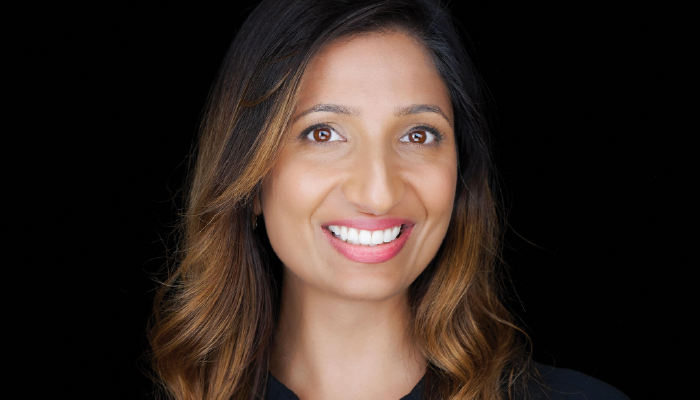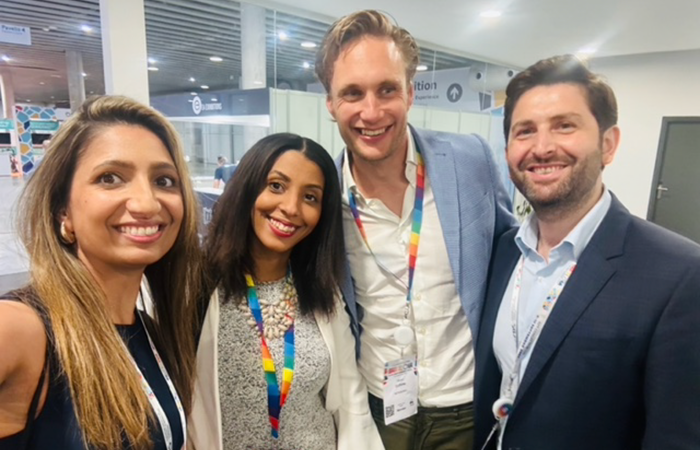
Pamela Katz Photography @pkheadshots
In this installment, founder and co-chair of the AECOS (American European Congress of Ophthalmic Surgery) Green Working Group (GWG), Radhika Rampat, discusses the progress being made towards sustainability in the industry, and how regulators are key to ensuring greater compliance throughout the profession.
Sustainability is a topic that seems ubiquitous at events and meetings. But how genuinely is ophthalmology invested in it?
We talk about it a lot on podiums, but the actions haven’t really trickled down to the actual hospitals or clinics in a meaningful way… and the mountains of waste continue!
But industry is very engaged and interested now, and I’m enjoying working with eye care professionals and industry to achieve our goals. I think there is a genuine interest, but it’s a mammoth task and so, the more we collaborate and work together alongside industry, clinicians, and allied health professionals, the better! The AECOS GWG endorses Eyesustain, and together we hope to continue to make a meaningful impact.
Is there still a problem of communicating the right messages?
The effects of climate change are being felt globally and messages of sustainability ring loudly everywhere you look. But on a day-to-day basis, we are overwhelmed by these types of messages – we have information overload and decision fatigue.
Every company is now expected to comply and put environmental, social, and governance (ESG) considerations at the forefront of its agenda, and both public hospitals and private clinics are encouraged solely to deal with these kinds of companies. You would think that’s enough encouragement, but the reality is that ESG still isn't prioritized as much as it should be.
This is where the AECOS GWG comes in. We are looking for meaningful connections, impactful projects, and creating consultancy in the way that is best – not by using external companies or auditors, but consulting with actual clinicians who are on the ground, noting their pain points and seeing where their daily waste comes from.
What are the most urgent sustainability priorities in the field?
Right now, the main issue is around huge amounts of unnecessary waste, both in paper and plastic.
In terms of paper, the challenge is with regulators. Although many companies have already made progress with this – for example, reducing their IOL (intraocular lens) packaging sizes, as well as reducing the weight of their IFUs (instructions for use) – there still remains the problem of having to have paper IFUs instead of just an e-IFU.
For plastics, the sheer volume used in single-dose units is astounding. But new bottled versions of preservative-free eye drops contain much less plastic and are in fact cheaper, so it’s a no-brainer that we should be choosing those for our practices.
There is also the issue of single-use surgical instruments. We ofcourse advocate sterilization and reusable instruments, but if we are using single-use instruments then we need to ensure that they are high quality stainless steel and can actually be recycled.
How are you working towards sustainability in ophthalmology?
Under the mentorship of Sheraz Daya and in collaboration with David Shahnazaryan, I started AECOS (American European Congress of Ophthalmic Surgery) Green Working Group (GWG) in 2022. Our motto is to ACT locally and impACT globally, and that’s exactly what we have done. Now we have expanded to USA too, with my co-chair, Neda Shamie.
We published an article in JCRS about IFUs and this naming and shaming is something we were not afraid to do. Many companies have upped their game since!
We are actively changing from PF Single Dose Units (SDUs) to PF Multi Dose Bottles (MDBs) and seeing a reduction of 80-90% in plastic waste but also a 15-70% reduction in cost – implementing this locally and further afield is on the horizon and we are excited to share more on this work in due course.
Finally, in terms of the mentioned Single Use Instruments – we are working with a group of companies who are facilitating production and supply of high quality recyclable single use ophthalmic instruments, collection of these in recycled(!) reusable yellow containers, which are picked up in an efficient manner and taken locally to be sorted and recycled into other stainless steel materials…. #sustainabilitygoals
We have created a network of AECOS champions and are advocating to have a Sustainability Warden for each eye unit globally. And our work is gaining traction – so watch this space!
How can the various ophthalmology stakeholders – clinicians, industry, regulators – work together to reach goals in sustainability?
I have been interviewing CEOs and ESG leads at various ophthalmic companies to truly understand what strides they are making towards sustainability, and then identifying ways in which we can leverage our network to help one another. Regulators are really the key, and we have already started conversations as to how we can get a seat at the table where these decisions are being made.

Radhika Rampat, Diana Silva (Eyesustain), Sjoerd Elferink (Eyesustain), and David Shahnazaryan (AECOS GWG)
Radhika Rampat is a consultant ophthalmic surgeon at the Royal Free Hospital, refractive surgeon and medical director at betterview (UK), honorary consultant ophthalmologist at Moorfields Eye Hospital, and Chair of the American European Congress of Ophthalmic Surgery (AECOS) Green Working Group
